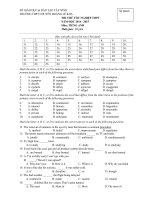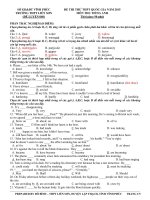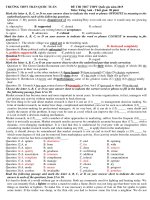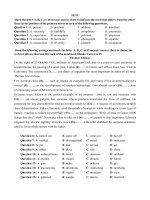- Trang chủ >>
- THPT Quốc Gia >>
- Ngoại Ngữ
thi thử thpt quốc gia môn tiếng anh, mã đề 12
Bạn đang xem bản rút gọn của tài liệu. Xem và tải ngay bản đầy đủ của tài liệu tại đây (134.08 KB, 8 trang )
SỞ GD-ĐT HÀ TĨNH
TRƯỜNG THPT TRẦN PHÚ
ĐỀ THI THỬ THQG - NĂM HỌC 2014 - 2015
MÔN: TIẾNG ANH
Thời gian làm bài: 90 phút (không kể thời gian giao đề)
Mã đề thi 12
Họ, tên thí sinh:
Số báo danh:
Mark the letter A, B, C, or D on your answer sheet to indicate the word whose underlined part is
pronounced differently from that of the others.
Question 1. A. Addition B. Adventure C. Advertise D. Advantage
Question 2. A. Christmas B. Chemical C. Switch D. Character
Mark the letter A, B, C, or D on your answer sheet to indicate the word that differs from the rest in
the position of the main stress in each of the following questions.
Question 3. A. Appeal B. Human C. Suffer D. Mission
Question 4. A. Consignation B. Abnormality C. Supplementary D. Confidence
Question 5. A. Alternative B. Improvement C. Modernize D. Exhausted
Mark the letter A, B, C, or D on your answer sheet to indicate the correct answer to each of the
following questions.
Question 6: The_______ horse began to run as fast as he could.
A. frightening B. frighten C. frightful D. frightened
Question 7: ______ is to give strangers your address.
A. What you must never do B.That you must never do
C. What must never you do D.That must never you do
Question 8: Nobody likes his behaviour, ________?
A. do they B. don’t they C. does he D. doesn’t he
Question 9: On no account _______ be touched.
A. this switch must B. must this switch C. you must D. must this switch not
Question 10: Have you heard about all the complaints? It _________ have been a pleasant holiday for them.
A. mayn’t B. shouldn’t C. mustn’t D. can’t
Question 11: Tom: “ Sorry, I forgot to phone you last night.” -Mary: “________”
A. I have nothing to tell you. B. Oh. Poor me!
C. Never mind! D. You was absent - minded.
Question 12: After running up the stairs, I was ________breath.
A. away from B. without C. no D. out of
Question 13: Having been selected to present the Association of American Engineers at the International
Convention, ________
1
A. the members applauded him B. a speech had to be given by him
C. the members congratulated him D. he gave a short acceptance speech
Question 14:Charlotte Bronte died of tuberculosis, ________.
A. as did all her sisters B. and all her sisters did
C. and so were all sisters D. either did all her sisters
Question 15: David: “ Why don’t we ask Martin to chair the meeting?”
Fiona: “ Well, suppose _________ to ask him, do you think he would accept?”
A. were we B. we have C. we try D. we were
Question 16: His father prefers _________ .
A. that he attend a different university B. that he attends a different university
C. he attends a different university D. he attend a different university
Question 17: Busy ________ he was , Bob’s father still spent time playing with him.
A. like B. though C. although D. however
Question 18:Extinction means a situation _______ a plan , an animal or a way of life ect …. stops existing.
A. to which B. in which C. on which D. for which
Question 19:As I was walking along the street, I saw _______ $ 10 note on _______ pavement.
A. a/ the B. the/ the C. a/ a D. the/a
Question 20: Thirty – eight national sites are known as parks, another eighty – two as monuments, and
_________ .
A. the another one hundred seventy – eight as historical sites
B. seventy – eight plus one hundred more as historical sites
C. the other one hundred seventy–eight as historical sites.
D. as historical sites one hundred seventy – eight.
Question 21:Tom : “This medicine tastes horrible! ” Mary : “________, it will cure your cough. ”
A. Be that as it may. B. Come what may C. How much horrible is it D. Whatever it tastes
Question 22: I’ve never really enjoyed going to the ballet or the opera; they’re not really my______.
A. piece of cake B. sweets and candy C. biscuit D. cup of tea
Question 23:John said that no other car could go ______.
A. so fast like his car B. as fast like his car C. as fast like the car of him D. as fast as his car
Question 24: Paul, do you think you could_______ for the night? It’s a bit too late to go home now.
A. let me off B. go me out C. fall me out D. put me up
Mark the letter A, B, C, or D on your answer sheet to indicate the word or phrase that is closest in
meaning to the underlined part in each of the following questions.
Question 25: She is always diplomatic when she deals with angry students.
A. strict B. outspoken C. tactful D. firm
2
Question 26: The book received a lot of good reviews in the press, and went on to become one of the year’s
best sellers
A. write-ups B. suggestions C. achievements D. supports
Question 27: John wants to buy a new car so he starts setting aside a small part of his monthly earnings.
A. spending on B. using up C. putting out D. saving up
Question 28: After all these years of good work, Arthur deserves a promotion.
A. ought to be denied B. might be produced
C. should be given D. could be rejected
Question 29: What is the principal distinction between ducks and geese?
A.relation B. difference C. characteristic D. similarity
Mark the letter A, B, C, or D on your answer sheet to show the underlined part that needs correction.
Question 30:Of the two lectures, the first was by far the best, partly because the person who delivered it had
A B C
such a dynamic style.
D
Question 31:John got his sister read his assignment, and then asked her to write the report for him because
A B C
he did not have enough time.
D
Question 32: The industry minister blamed lower production figures for a severe shortage of raw material
A B C D
and frequent strikes by workers.
Question 33: A basic knowledge of social studies, such as history and geography, are considered a
A B C
basic part of the education of every child.
D
Question 34: Drug addiction has resulted of many destroyed careers and expulsions from school or college.
A B C D
Read the following passage and mark the letter A, B, C, or D on your answer sheet to indicate the correct
word or phrase that best fits each of the numbered blanks.
The overall outlook for the hotel and tourism industry in Vietnam is very (35)____ . Tourism is
viewed as an important economic (36)____ in the future development of this country, and it is easy to see
why Vietnam , among the countries in South East Asia, has become increasingly popular as a new (37)____
destination. The sublime beauty of the country’s natural settings is very (38)____ . The sights, the sounds
and the tastes of Vietnam leave a lasting memory for many foreign (39)____ . Its key destination such as
Dalat, PhanThiet, Hoi An or NhaTrang are offering, indeed, great tourism (40)____ .
Combine this with the friendly nature of the Vietnamese people and the current political (41)____ ,
3
and we are set for solid growth pattern for the years to come. It is therefore not a surprise that foreign
(42)____ to Vietnam have steadily increased during the past few years.
Also important is the increasing demand from the domestic market. It is projected that 17 million
domestic (43)____ will make a short trip in 2005 within the country for leisure and (44)____.
Question 35. A. famous B. good C. positive D. proud
Question 36. A. force B. goal C. growth D. task
Question 37. A. tour B. tourist C. tourism D. touring
Question 38. A. impress B. impressive C. impressing D. impression
Question 39. A.friends B. foreigners C.visitors D. people
Question 40. A. industry B. value C. growth D. worth
Question 41. A. stable B. stability C.unstable D. instability
Question 42. A. arrive B. arriving C. arrival D. arrivals
Question 43. A. tourists B. people C. guides D. interpreters
Question 44. A. relax B. relaxation C. relaxed D. relaxing
Read the following passage and mark the letter A, B, C, or D on your answer sheet to indicate the correct
answer to each of the questions.
Today we take electricity for granted and perhaps we do not realize just how useful this discovery
has been. Steam was the first invention that replaced wind power. It was used to drive engines and was
passed through pipes and radiators to warm rooms. Petrol mixed with air was the next invention that
provided power. Exploded in a cylinder, it drove a motor engine. Beyond these simple and direct uses, those
forms have not much adaptability. On the other hand, we make use of electricity in thousands of ways. From
the powerful voltages that drive our electric trains to the tiny current needed to work a simple calculator, and
from the huge electric magnet in steel works that can lift 10 tons to the tiny electric magnet in a doorbell, all
are powered by electricity. An electric current can be made with equal ease to heat a huge mass of molten
metal in a furnace, or to boil a jug for a cup of coffee. Other than atomic energy, which has not as yet been
harnessed to the full, electricity is the greatest power in the world. It is flexible, and so adaptable for any task
for which it is wanted. It travels so easily and with incredible speed along wires or conductors that it can be
supplied instantly over vast distances. To generate electricity, huge turbines or generators must be turned. In
Australia they use coal or water to drive this machinery. When dams are built, falling water is used to drive
the turbines without polluting the atmosphere with smoke from coal. Atomic power is used in several
countries but there is always the fear of an accident. A tragedy once occurred at Chernobyl, in Ukraine, at an
atomic power plant used to make electricity. The reactor leaked, which caused many deaths through
radiation. Now scientists are examining new ways of creating electricity without harmful effects to the
environment. They may harness the tides as they flow in and out of bays. Most importantly, they hope to
trap sunlight more efficiently. We do use solar heaters for swimming pools but as yet improvement in the
capacity of the solar cells to create more current is necessary. When this happens, electric cars will be viable
and the world will rid itself of the toxic gases given off by trucks and cars that burn fossil fuels.
Question 45. Which of the following power sources causes pollution by emitting harmful gases?
A. Wind. B. Petrol. C. Water. D. Sunlight.
Question 46. The word "they" in the last paragraph refers to ______.
A. the tides B. scientists C. harmful effects D. new ways
Question 47. What do we call machines that make electricity?
A. Voltages B. Generators or turbines. C. Pipes and radiators. D. Electric magnets.
Question 48. Before electricity, what was sometimes passed through pipes to heat rooms?
4
A. Gas. B. Hot wind C. Steam D. Petrol
Question 49. The author mentions the sources of energy such as wind, steam, petrol in the first paragraph to
______.
A. emphasize the usefulness and adaptability of electricity
B. suggest that electricity should be alternated with safer sources of energy
C. imply that electricity is not the only useful source of energy
D. discuss which source of energy can be a suitable alternative to electricity
Question 50. What does the author mean by saying that electricity is flexible?
A. It is used to drive motor engines. B. It can be adapted to various uses.
C. It can be made with ease. D. It is cheap and easy to use.
Question 51. The main forms of power used to generate electricity in Australia are ______.
A. atomic power and water B. wind and gas
C. water and coal D. sunlight and wind power
Question 52. Electric magnets are used in steel works to ______.
A. heat the molten steel B. lift heavy weights up to ten tons
C. test the steel for strength D. boil a jug of water
Question 53. The advantage of harnessing the power of the tides and of sunlight to generate electricity is
that they _____.
A. do not require attention B. are more adaptable
C. do not pollute the environment D. are more reliable
Question 54. The best title for this passage could be ______.
A. “Types of Power Plants” B. “Why Electricity Is So Remarkable”
C. “Electricity: Harmful Effects on Our Life” D. “How to Produce Electricity”
Read the following passage and mark the letter A, B, C, or D on your answer sheet to indicate the correct answer to each of the
questions.
Before the mid-nineteenth century, people in the United States ate most foods only in season. Drying,
smoking and salting could preserve meat for a short time, but the availability of fresh meat, like that of fresh
milk, was very limited; there was no way to prevent spoilage. But in 1810, a French inventor named Nicolas
Appert developed the cooking-and-sealing process of canning. And in the 1850’s an American named Gail
Borden developed a means of condensing and preserving milk. Canned goods and condensed milk became
more common during the 1860’s, but supplies remained low because cans had to be made by hand. By 1880,
however, inventors had fashioned stamping and soldering machines that mass-produced cans from tinplate.
Suddenly all kinds of food could be preserved and bought at all times of the year.
Other trends and inventions had also helped make it possible for Americans to vary their daily diets.
Growing urban population created demand that encouraged fruit and vegetable farmers to raise more
produce. Railroad refrigerator cars enabled growers and meat packers to ship perishables great distances and
to preserve them for longer periods. Thus, by the 1890’s, northern city dwellers could enjoy southern and
western strawberries, grapes, and tomatoes, previously available for a month at most, for up to six months of
the year. In addition, increased use of iceboxes enabled families to store perishables. As easy means of
producing ice commercially had been invented in the 1870’s, and by 1900 the nation had more than two
thousand commercial ice plants, most of which made home deliveries. The icebox became a fixture in most
homes and remained so until the mechanized refrigerator replaced it in the 1920’s and 1930’s.
5
Almost everyone now had a more diversified diet. Some people continued to eat mainly foods that were
heavily in starches or carbohydrates, and not everyone could afford meat. Nevertheless, many families could
take advantage of previously unavailable fruits, vegetables, and dairy products to achieve more varied fare.
Question 55. What does the passage mainly discuss?
A. Causes of food spoilage
B. Commercial production of ice
C. Population movements in the nineteenth century
D. Inventions that led to changes in the American diet
Question 56. The phrase “in season” in line 1 refers to ________ .
A. a particular time of year B. a kind of weather
C. an official schedule D. a method of flavoring
Question 57. During the 1860’s, canned food products were _________ .
A. unavailable in rural areas B. available in limited quantities
C. shipped in refrigerator cars D. a staple part of the American diet.
Question 58. It can be inferred that railroad refrigerator cars came into use _________ .
A. before 1860 B. before 1890 C. after 1900 D. after 1920
Question 59. The word” them” in line 12 refers to _________ .
A. refrigerator cars B.growers C. perishables D. distances.
Question 60. The word” fixture” in line 16 is closest in meaning to _________ .
A. commonplace object B. substance C. luxury item D. mechanical device
Question 61.The author implies that in the 1920’s and 1930’s home deliveries of ice _________ .
A. increased in cost B. occurred only in the summer
C. decreased in number D. were on an irregular schedule
Question 62. The word “ Nevertheless” in line 19 is closest meaning to _________ .
A. occasionally B. however C. therefore D. because
Question 63. Which of the following types of food preservation was NOT mentioned in the passage?
A. Drying B. Chemical additives C. Canning D. Cold storage
Question 64. Which of the following statements is supported by the passage?
A. Most farmers in the United States raised only fruits and vegetables.
B. People who lived in cities demanded home delivery of foods.
C. Tin cans and iceboxes helped to make many foods more widely available.
D. Commercial ice factories were developed by railroad owners
WRITING
Part I: Finish each of the following sentences in such a way that it means the same as the sentence
printed before it.
Question 65: It is said that he escaped in a stolen car.
6
> He is……………………………………………………
Question 66: I would prefer you to deliver the sofa on Sunday.
> I would rather …………………………………………………………………………
Question 67: This village is inaccessible in winter due to heavy snow.
> Heavy snow makes …………………………………………………………………………………. …
Question 68: “Why don’t you ask your boss for a rise?” He asked me.
> He advised …………………………………………………………………………………………
Question 69: I was not surprised to hear that Harry had failed his driving test.
> It came ………………………………………………………………………………
Part II: In about 140 words, write a paragraph to describe one of the most important holidays in Vietnam.
THE END
ĐÁP ÁN
PHẦN TRẮC NGHIỆM (8 điểm)
1. C 17. B 33. C 49. A
2. C 18. B 34. B 50. B
3. A 19. A 35. C 51. C
4. D 20. C 36. A 52. B
5. C 21. A 37. C 53. C
6. D 22. D 38. B 54. B
7. A 23. D 39. C 55. D
8. A 24. D 40. B 56. A
9. B 25. C 41. B 57. B
10. D 26.A 42. D 58. B
11. C 27. D 43. A 59. C
12. D 28. C 44. B 60. A
7
13. D 29. B 45. D 61. C
14. A 30. B 46. A 62. B
15. D 31. A 47. B 63. B
16. A 32. B 48. C 64. C
PHẦN VIẾT (2 điểm)
I (0,5 điểm)
Câu 65: He is said to have escaped in a stolen car.
Câu 66: I would rather you delivered the sofa on Sunday.
Câu 67: Heavy snow makes it impossible to reach this village.
Câu 68: He advised me to ask my boss for a rise.
Câu 69: It came as no surprise to me that Harry had failed his driving test.
8









